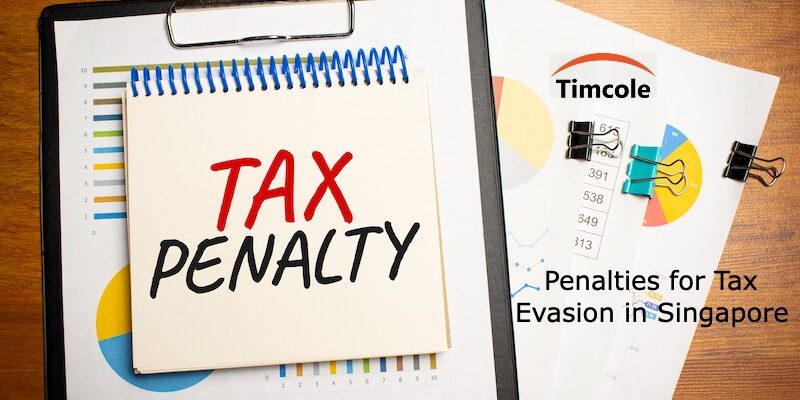Governments enact tax regulations to make sure that people pay all the taxes they should be paying. However, some people try to avoid making such tax payments by engaging in either tax evasion or tax avoidance. These two actions are not equivalent, though. The main distinction is that tax avoidance is permissible while tax evasion is against the law.
A person may acquire a tax benefit through lawful methods by resorting to tax avoidance. Tax evasion, on the other hand, is prohibited since it includes the employment of dubious ways to avoid paying taxes. It often also entails the declaration of fictitious assets. As a result, governments throughout the world have enacted particular tax laws that severely penalise tax violators.
Tax Evasion: What Is It?
Tax evasion in Singapore occurs when an individual knowingly provides incorrect or incomplete information to the nation’s tax authority, the Inland Revenue Authority of Singapore (IRAS); in order to fraudulently reduce their tax bill and/or get unauthorised tax credits and refunds.
According to the Income Tax Act, tax evasion can happen when someone deliberately:
- Fails to adequately disclose all assessable income while submitting taxes, for example, by under – or not declaring their income; or
- Asserts the right to a tax credit for costs that were not incurred (e.g. creating fake invoices or false entries or hiring phantom employees); or
- Claims a tax deduction for a cost that isn’t tax deductible (e.g. deductions on private motor car expenses or inflated payments to parties related to the company); or
- Requests personal aid on behalf of dependents that do not exist.
What are the Consequences of Tax Evasion in Singapore?
For Evading Taxes
Tax evasion and non-compliance with the law are essential concerns for IRAS.
If you are found guilty of tax evasion, you will face a penalty equal to three times the amount of underpaid taxes and/or ineligible tax benefits. This is in addition to a $10,000 fine and/or a prison sentence of a maximum of 3 years.
Regarding Egregious Fraud In Tax Evasion
The more egregious types of tax evasion include the falsifying of accounting records and committing any kind of fraud.
If you are found guilty of such serious and fraudulent tax evasion, you will be subject to a penalty equal to four times the amount of underpaid taxes and/or ineligible tax benefits. In addition, you might also be subject to a fine of up to $50,000 and/or a 5-year prison sentence.
For Evading GST
If you are found guilty of GST evasion, you will be subject to a fine equal to three times the underpaid tax. Additionally, you risk receiving a fine of up to $10,000 and/or a 7-year prison sentence.
For Providing False Information On Tax Liability
Giving false information about your tax responsibilities might result in punishment, even if you had no intention of evading taxes. Submitting an improper tax return or providing inaccurate information about yourself or another person’s tax responsibilities without due care or justification is against the law.
If you are found guilty of providing false information regarding your tax obligations, you might face fines of up to $5,000, a prison sentence of up to three years, and penalties equal to double the amount of underpaid taxes and/or tax benefits.
Summary of Penalties for Tax Evasion
As previously said, Singapore takes tax evasion very seriously, and as a result, the penalties for doing so are harsh enough. Those who are found guilty of tax evasion in Singapore might face:
- A 300% penalty on any underpaid taxes;
- A penalty of 300% of any GST that was not fully imposed;
- $10,000 in fines, three years in jail, or both;
- A 400% fine for any underpaid tax if it was discovered that falsified documents were involved. Additionally, anyone found guilty might face a fine of up to $50,000, five years in jail, or both; and
- Companies may be subject to S$10,000 penalties, with guilty parties getting prison terms of up to seven years.
How Singapore’s Taxpayers May Prevent Tax Evasion?
Individual taxpayers in Singapore must correctly report their income and submit their tax payments on time to avoid penalties from the government. Making sure that one does not engage in any tax avoidance is possible in several ways.
One of these is to refrain from presenting fake tax or rent receipts when making an exemption or claim. A person may also be found guilty of tax evasion if they have not been dwelling in the home for which loans are being requested. Producing the proper loan documentation is another approach for people to be sure they are not engaging in tax avoidance.
One must not make any unauthorised tax claims if they have already paid off a loan to a bank or other financial institution. In addition, any Singaporean taxpayer who has received interest income is also required to ensure the government is aware of it.
How Can Businesses in Singapore Avoid Tax Evasion?
By taking the proper actions, businesses in Singapore can make sure that they don’t become involved in any kind of tax evasion. Companies can be held accountable for tax evasion violations even if they are unaware that any of their own employees or associates have been responsible for dodging taxes. Companies in Singapore may also be held accountable if they do not pursue legal action against persons who they know have committed crimes.
Any Singapore firm that wishes to avoid being held accountable for tax evasion violations must present documentation proving that it has taken all necessary precautions to prevent that from happening.
Conducting training sessions for their employees is one way for businesses to ensure that no acts of tax evasion have been perpetrated within their own company. In addition, these classes will assist employees in comprehending the negative consequences of tax evasion.
Companies must also make sure that employees are aware of the harsh punishments and measures that will be taken against them should they or any of their associates fail to pay their taxes.
To prevent any penalties resulting from business collaborations, corporations must also complete a risk assessment of any third parties that are doing business with them. In addition, Singaporean business owners can check a customer’s tax compliance status to safeguard their own enterprise.
They can consult with the government to verify the tax status of their clients. Additionally, business owners should make sure that their employees can distinguish between legitimate tax avoidance and fraudulent tax evasion. Further, they must encourage staff members to inform the business of any instances of tax evasion activity that they are aware of.
Also, to eliminate the chances of any tax evasion, the best option is to appoint an experienced tax consultant who can manage your taxation as well as advise you on how to save on them legally.
Tax Evasion vs Tax Avoidance: What’s the Difference?
The Singaporean government relies on tax regulations to ensure its residents pay their fair share of taxes. However, even if the majority of people do follow the law, there will be some who may try to cheat the system by avoiding or evading taxes. Tax avoidance is allowed, but tax evasion is illegal. These are two distinct actions.
Tax avoidance: When someone uses legal tactics to obtain a tax benefit, they engage in tax avoidance. To be able to do this, the person must be aware of the taxation laws and system.
Tax evasion: This entails using illegal means to avoid paying taxes and is a crime. This covers actions including under-reporting or omitting of revenue, misrepresentation in reporting of taxes, transferring of earnings without justification, and/or over-claiming of expenses, among others.
According to the Inland Revenue Authority of Singapore (IRAS), tax evasion and aggressive tax avoidance are both wrong. Therefore, IRAS vigorously combats tax evasion in conjunction with other global tax regulatory organisations through audits and investigations to ensure that taxes are paid in full, and tax evaders are penalised.
The Conclusion
Tax evasion hurts a nation’s economy because it creates inequality between citizens of various socioeconomic classes. To battle the epidemic of tax evasion, it is vital to take action against tax evaders. The penalties enforced for tax evasion in Singapore seek to dissuade any individual taxpayer or business from engaging in such behaviour.
Additionally, IRAS has been actively urging citizens to report any instances of tax evasion that may have occurred in Singapore. To encourage as many individuals as possible to follow suit and disclose any instance of tax evasion to IRAS, all whistleblowers will also be offered a sizeable incentive.
Legal Tax Planning in Singapore
Legitimate tax planning should always stay within the parameters of the law in Singapore. This means that transactions should always be carried out with commercial reasons in mind.
🔖 Read the tips for effective tax planning for Singapore companies.

Here at Timcole, we work closely with our clients to identify tax strategies that work best for them.
Feel free to contact us to learn more about what we could do for you.








